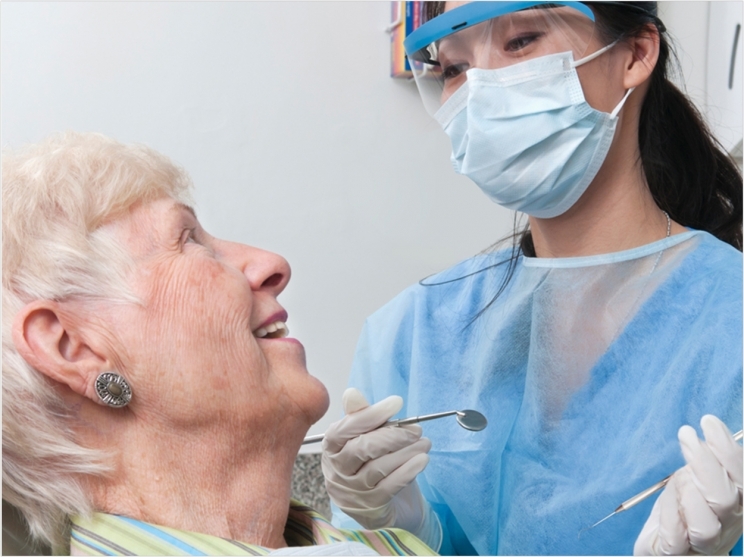
Most dentists in the United States are willing to provide care to Medicare recipients if dental benefits were added to Medicare coverage, according to Cassandra Yarbrough, lead public policy analyst at the ADA’s Health Policy Institute (HPI).
At the American Public Health Association’s Monday Annual Meeting session on November 12 in San Diego on “Equity in Access to Dental Health,” Yarbrough outlined two HPI surveys that show dentists support expanded Medicare coverage.
However, the ADA does not endorse adding dental benefits to Medicare coverage. At its October annual conference, the ADA adopted a resolution calling for its president to appoint an ad hoc committee to review and update existing policy and to identify an implementation plan and timeline to address elder care, including Medicare.
“The reason we started doing this work is because for the last five years or so, there’s been this convening of national stakeholders actively pursuing the addition of dental coverage to Medicare,” Yarbrough said.
In July, a coalition of consumer advocacy groups including Oral Health America released the white paper “An Oral Health Benefit in Medicare Part B: It’s Time to Include Oral Health in Health Care.”
Medicare covers 59 million people. Only one-third of Medicare beneficiaries have some level of dental coverage, primarily through Medicare Advantage plans. In 2016, only 43% of people age 65 and older in the United States had a dental visit, according to Yarbrough.
The first survey questioned 20,000 licensed and active dentists age 55 and younger between May and June 2017. More than 50% “strongly” or “somewhat” agreed that government has a role in providing oral health care to those age 65 and older. Almost 28% supported a benefit that provided preventive services, while 36% supported a comprehensive plan. About 25% supported no plan.
“This research is important regardless of the response rate because it might be a catalyst for more research,” Yarbrough said. “It also provides a viewpoint that I think is often missing when bills are introduced to Congress.”
If a policy change in the United States resulted in more people age 65 and older having some form of dental benefits, 55% of those surveyed said they were “very likely” to care for these patients, while 22% said they were “somewhat likely.”
Also, 39% said they were “very willing,” and 26% said they were “somewhat willing” to make some changes to their practice, such as learning new diagnostic codes or using electronic health records if the payment rates were comparable to private plan payments.
“Across all of the questions, we did get a majority saying ‘yes, we should have this; yes, I would participate; and yes, I’d be willing to make some changes,” Yarbrough said.
The HPI’s second survey used the term “Medicare” in case the original survey questions weren’t clear enough to participants. The results of the second survey mirrored the first. The January 2018 survey was sent to 20,000 randomly selected licensed dentists.
Each page of the online survey included a section explaining the difference between Medicare and Medicaid. It pointed out that Medicare physician reimbursement rates are typically about 80% of private insurance rates.
Also, the survey explained that adding dental coverage to Medicare would increase patient volume and require dental offices to adapt to new federal rules, including use of diagnostic codes and electronic health records and reporting quality metrics.
“There is strong support among dentists for dental services for seniors, and this support actually grew stronger when we were specific about the fact that we were talking about Medicare coverage for seniors, and this was regardless of age of gender,” said Yarbrough.
“A majority of dentists reported they would participate in Medicare if rates mirrored what physicians get now, which is 80% of typical private insurance dental rates,” Yarbrough said.
Yarbrough’s presentation followed presentations on the high cost of dental care in emergency rooms, with most visits from people on Medicaid or who are uninsured; a pilot project integrating dental care with chronic disease care, specifically diabetes care; and a case study showing a model oral healthcare program for seniors. All of these topics are connected to the Medicare issue, Yarbrough said.
“When I look at this as a policy analyst, I notice in healthcare that changes trickle down from Medicare,” she said.
“If we can get this coverage in Medicare, it will address our Medicaid issue with emergency departments. It will also give us a platform for asking people to be creative like with [accountable care organizations] or value-care payments, so we can get integrated care and bring oral health into systemic health.”
Related Articles
White Paper Calls for Dental Benefits in Medicare Coverage
79% of Older Voters Want Dental Coverage in Medicare
93% of Adults Favor Adding Dental Coverage to Medicare











